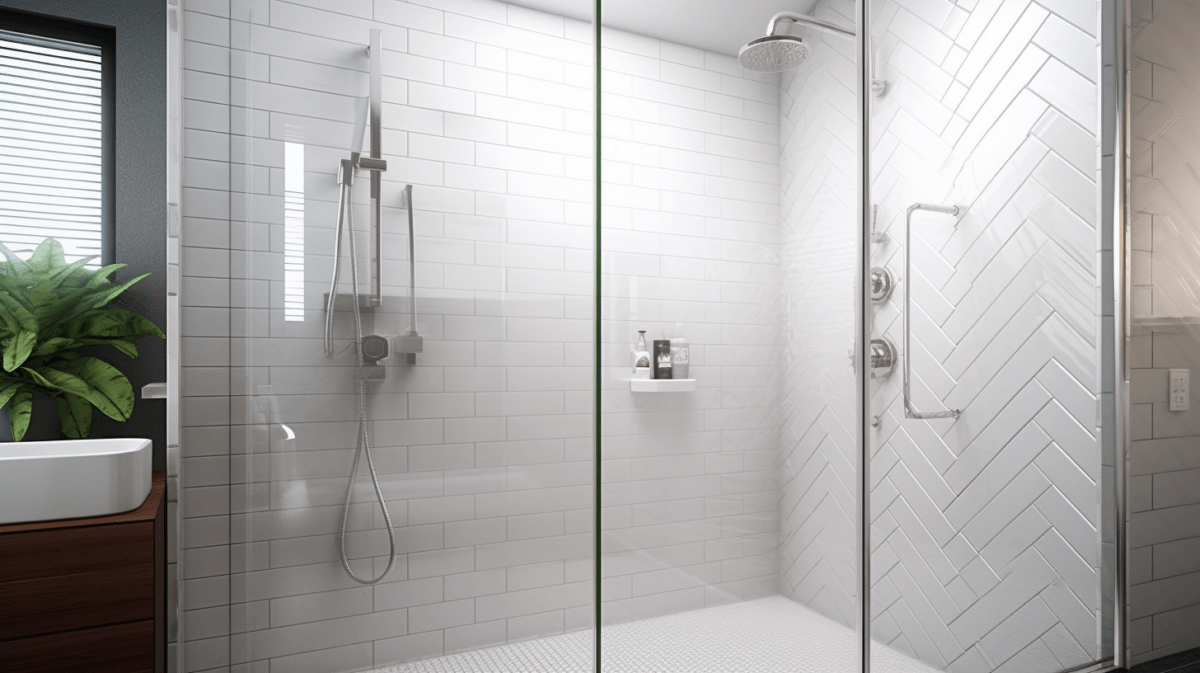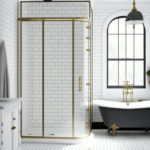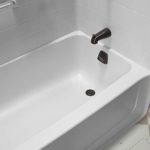
Ceramic, Porcelain, Glass, or Natural Stone? Which Tiles are Best for Shower Walls?

I. Introduction
A. Importance of choosing the right tiles for shower walls
Hey there, fellow home renovators! Let’s talk about the importance of choosing the right tiles for your shower walls. Trust me, as someone who has tackled plenty of bathroom renovations, this is a crucial decision that can make or break your entire project.
Choosing the right tiles for your shower walls is a decision that should not be taken lightly. From materials to size to aesthetics, there are plenty of factors to consider, but it’s all worth it in the end. Trust me, your future self (and your wallet) will thank you for it!
B. Brief overview of the article content
Now that we’ve established why choosing the right tiles for your shower walls is so important, let me give you a brief overview of what you can expect in this article.
First off, we’ll delve into the different types of materials that are suitable for shower wall tiling, including ceramic, porcelain, natural stone, and glass. Each material has its own pros and cons, so it’s important to weigh them carefully before making a decision.
Next, we’ll talk about the size and shape of the tiles, and how it can affect the overall look and maintenance of your shower walls. From small mosaic tiles to large format porcelain tiles, we’ll cover everything you need to know to make an informed decision.
Ready to dive into the world of shower wall tiles? Don’t forget to check out Place Call Home’s article on the best bathtub and shower wall options for even more insight!
Of course, we can’t forget about the design and aesthetics! We’ll showcase some popular tile designs and patterns, as well as tips on how to mix and match different tiles to create a unique and personalized look for your shower walls.
But it’s not just about the tiles themselves – we’ll also cover some key installation and maintenance tips to ensure that your shower walls look great for years to come. From grout options to sealing and cleaning, we’ll give you all the insider knowledge you need to keep your tiles looking as good as new.
So, whether you’re a seasoned DIYer or a first-time bathroom renovator, this article has got you covered with all the essential information you need to choose the best tiles for your shower walls. Get ready to unleash your inner tile enthusiast and create a bathroom that’s both functional and stylish!
II. Factors to Consider When Choosing Shower Wall Tiles
A. Water resistance
Now, let’s talk about one of the most important factors when it comes to choosing the right tiles for your shower walls – water resistance.
When you’re taking a shower, water is obviously going to be splashing around like crazy, and if your tiles aren’t up to the task, you’re in for a world of trouble. That’s why it’s crucial to choose a material that can withstand water and moisture without getting damaged or developing mold.
Don’t let water damage ruin your shower walls! To ensure your tiles are water-resistant, check out our guide to waterproofing your tub and shower surround. With this DIYer’s guide, you’ll have all the knowledge and tips you need to keep your bathroom dry and your tiles looking great.
Ceramic and porcelain tiles are some of the most popular options when it comes to shower wall tiling, and for good reason. They’re both highly water-resistant and durable, making them ideal for withstanding the damp and humid environment of your bathroom.
Natural stone and glass tiles, on the other hand, may require a bit more maintenance to ensure their water resistance. Natural stone is porous and may need to be sealed regularly, while glass tiles may require special grout and sealing to prevent water from seeping through.
B. Durability
Your shower walls are going to be exposed to a lot of wear and tear over the years, from daily showers to occasional splashes and spills. That’s why it’s important to choose a tile material that can withstand the test of time and won’t require constant repairs or replacements.
Ceramic and porcelain tiles are once again at the top of the list when it comes to durability. These materials are tough and long-lasting, able to withstand scratches, chips, and general wear and tear without breaking a sweat.
Natural stone tiles like marble and granite are also durable, but may require a bit more maintenance to keep them looking their best. They’re prone to staining and etching, so make sure to seal them properly and avoid using harsh cleaning products.
Glass tiles are a bit more delicate than the other options, but can still be a durable choice if you choose a high-quality, thick tile. Just make sure to handle them with care during installation and cleaning to avoid cracking or chipping.
In short, if you want your shower walls to stand the test of time, go for a tile material that’s known for its durability, like ceramic or porcelain. And don’t forget to choose a size and thickness that’s appropriate for the level of wear and tear your shower will be subjected to. With the right tiles in place, you’ll have a shower that’s not just functional, but also stylish and long-lasting.
C. Maintenance requirements
No one wants to spend their weekends scrubbing grout or dealing with stubborn mold and mildew in their shower. That’s why it’s crucial to choose a tile material that’s easy to maintain and won’t require too much elbow grease to keep clean.
Glazed ceramic and porcelain tiles are once again a top choice when it comes to low-maintenance shower walls. The glaze on these tiles helps repel dirt and stains, making them easy to wipe down with a damp cloth or sponge. Plus, they’re generally non-porous, so you don’t have to worry about water seeping into the tile and causing damage.
Natural stone tiles, on the other hand, require a bit more maintenance to keep them looking their best. You’ll need to seal them regularly to prevent staining and discoloration, and use specialized cleaning products to avoid damaging the stone.
Glass tiles are relatively low-maintenance, as long as you choose a high-quality grout that won’t discolor or crack over time. However, they’re prone to showing water spots and smudges, so you’ll need to wipe them down frequently to keep them looking their best.
So, before you commit to a particular tile material for your shower walls, make sure to consider how much maintenance you’re willing to put in. If you want a low-maintenance option that still looks great, glazed ceramic or porcelain tiles are a safe bet. But if you’re willing to put in a bit more effort to keep your shower looking stunning, natural stone tiles or glass tiles might be the perfect choice for you.
D. Slip resistance
Ah, slip resistance – the last thing you want is to slip and fall while you’re getting squeaky clean in the shower!
Ceramic and porcelain tiles are once again a great option for slip resistance, especially if you choose tiles with a matte or textured finish. These types of tiles offer more grip and traction than their glossy counterparts, which can be quite slippery when wet.
Natural stone tiles can also be a good choice, as many varieties have a naturally textured surface that provides good slip resistance. However, some types of natural stone can be quite smooth, so it’s important to choose a variety that’s known for its slip-resistant qualities.
Glass tiles, on the other hand, can be quite slippery, especially if they’re installed with a smooth or glossy grout. If you’re set on glass tiles, make sure to choose a grout that offers good slip resistance and texture.
When it comes to slip resistance, the size and shape of your tiles can also play a role. Larger tiles with a more textured surface are generally more slip-resistant than smaller mosaic tiles with a smooth surface.
So, if you’re looking for a shower that’s both safe and stylish, make sure to choose a tile material that offers good slip resistance. Ceramic and porcelain tiles with a matte or textured finish are a great choice, as are many types of natural stone tiles. Just make sure to avoid glass tiles with a smooth surface and choose a grout that offers good slip resistance.
E. Aesthetics
Ceramic and porcelain tiles come in a wide range of colors and patterns, so you’re sure to find something that suits your style. From classic white subway tiles to bold geometric patterns, the possibilities are endless.
Natural stone tiles are another great option if you’re looking for a more earthy, organic feel. With their unique veining and natural variations, they can add a touch of luxury to any bathroom.
And then there’s glass – oh, the beauty of glass tiles! With their glossy finish and iridescent shimmer, glass tiles can add a touch of glamor and elegance to any shower. They come in a wide range of colors and finishes, from classic clear glass to bold, bright hues.
But aesthetics aren’t just about the color and material of your tiles – it’s also about how they’re installed. The right grout color can make all the difference, whether you choose a contrasting color for a bold look or a matching color for a more seamless appearance.
And don’t forget about the size and shape of your tiles! From traditional square tiles to hexagons and beyond, the right size and shape can add interest and dimension to your shower walls.
So, when it comes to aesthetics, the options are endless. Whether you choose ceramic, porcelain, natural stone, or glass, make sure to consider the color, material, grout color, and size/shape of your tiles to create a shower that’s as beautiful as it is functional.
F. Cost
The truth is, the cost of your shower tiles can vary greatly depending on the material you choose, the size of your shower, and the complexity of the installation. Ceramic and porcelain tiles are typically the most budget-friendly option, while natural stone and glass tiles can be more expensive.
But don’t let the cost scare you off! Remember, investing in quality tiles for your shower walls can save you money in the long run by reducing the need for repairs and replacements down the line.
And here’s a fun fact for you – did you know that the size of your tiles can also affect the cost? It’s true! Larger tiles can be more expensive because they require more precise cutting and installation, while smaller tiles can be more affordable and easier to install.
Ultimately, the cost of your shower tiles will depend on your individual budget and priorities. But remember, even if you’re on a tight budget, there are still plenty of stylish and functional tile options out there that won’t break the bank.
So, don’t let the cost scare you off – with a little bit of research and creativity, you can find the perfect tiles for your shower walls that meet both your practical and aesthetic needs.
III. Types of Tiles Suitable for Shower Walls
Alrighty then, let’s dive into the types of tiles that are suitable for shower walls! As we mentioned earlier, there are a variety of materials to choose from, each with their own pros and cons. So, let’s break it down:
Looking to install new tiles for your shower walls but not sure how to go about it? Check out our comprehensive guide to installing a tub or shower surround for all the information you need to get started! And if you’re still deciding on the best type of tile for your needs, be sure to read our section on types of tiles suitable for shower walls. With the right tile and installation, your shower walls will look amazing for years to come!
A. Ceramic Tiles
Ceramic tiles are a classic choice for shower walls. They’re affordable, durable, and come in a variety of sizes and colors. Plus, they’re glazed, which makes them water-resistant and easy to clean.
B. Porcelain Tiles
If you’re looking for something even more durable, porcelain tiles are a great option. They’re made from a denser type of clay than ceramic tiles, which makes them less porous and more resistant to water damage. Plus, they come in a range of styles, from matte to glossy finishes.
C. Natural Stone Tiles
For a more high-end look, natural stone tiles like marble and granite can add a touch of elegance to your shower walls. They’re durable and water-resistant, but do require more maintenance to prevent staining and discoloration.
D. Glass Tiles
Glass tiles can create a stunning visual effect in your shower, with their iridescent and reflective surfaces. They’re also easy to clean and maintain. However, they can be more expensive than other materials and may not be as durable in the long run.
E. Mosaic Tiles
Mosaic tiles are a great way to add some visual interest to your shower walls. They’re made up of small, usually square, pieces of tile arranged in a pattern or design. They can be made from a variety of materials, including ceramic, glass, and natural stone.
F. Other Materials
Other materials like cement, metal, and even wood can also be used for shower walls, but they require more maintenance and may not be as durable in the long run.
VI. Conclusion
Alrighty, folks, we’ve come to the end of our journey in search of the best tiles for shower walls. To summarize, we’ve discussed the importance of choosing the right tiles based on water resistance, durability, maintenance requirements, slip resistance, aesthetics, and cost. We also took a deep dive into the different types of tiles suitable for shower walls, such as porcelain, ceramic, natural stone, and glass.
Remember, when selecting the best tiles for your shower walls, it’s important to consider not only their functional characteristics but also their visual appeal. After all, you want to create a bathroom space that’s both beautiful and functional.
If you’re still feeling unsure about which tiles to choose, be sure to consult with a professional. And, as always, make sure to do your own research and shop around for the best deals.
Thanks for joining me on this journey, and happy tiling!






